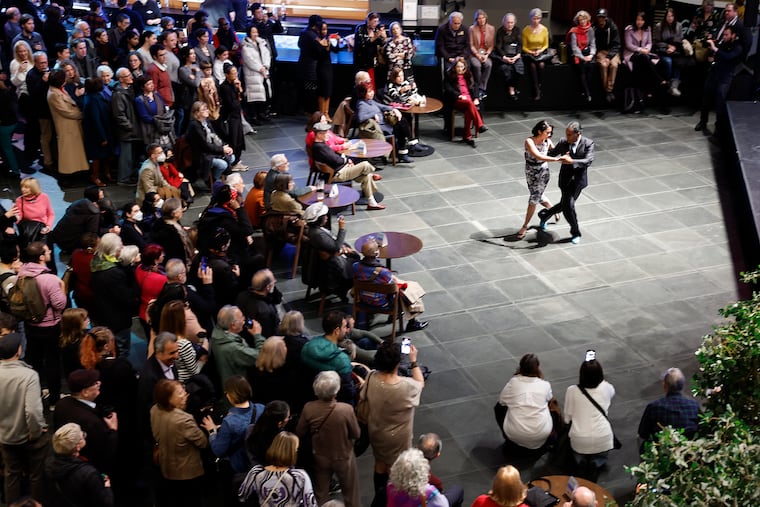The Philadelphia Orchestra’s new concert format is the freshest happy hour in town
The new format is earlier, shorter, and aims to make new friends. It may or may not involve tango and cocktails.

Meet you at the orchestra at 5? The Philadelphia Orchestra is hoping so.
Leaders of the ensemble are trying mightily to meet listeners where they are, and Thursday they rolled out their latest secret weapon: tango. As offices were emptying and many were strolling home or beating a path back to the ‘burbs, a crowd of perhaps a couple hundred gathered in the Kimmel Center lobby for themed cocktails and Brazilian tunes played by Ernesto’s Club.
Dubbed “Orchestra After 5,” the new series aims to repackage a 350-year-old art form still perceived by some as unapproachable — “a classical concert with a casual vibe,” the new series’ tagline offers.
This first one began in the lobby, moved on to a one-hour concert starting at 6:30, and finished with an informal postconcert chat. If the goal was to lure listeners beyond the traditional base, it was a wild success. The audience grew to a decent size and was made up of a mix of young and old, couples and singles, newbies and loyal fans.
Inside Verizon Hall, a little more than two dozen Philadelphia Orchestra musicians performed a piece that was both Vivaldi’s The Four Seasons, and not. Orchestra concertmaster David Kim was the superb soloist, Xian Zhang the expressive and imaginative conductor, and the music a “musical collage 250 years in the making,” as Tristan Rais-Sherman, the amiable host, pointed out.
In this specially constructed piece, Kim played movements from Vivaldi’s famous work interspersed with Astor Piazzolla’s The Four Seasons of Buenos Aires in the arrangement for solo violin and strings by Leningrad Conservatory-trained composer Leonid Desyatnikov.
The provenance of the music might have been a mind-bender, yet the effect was anything but. Piazzolla’s signature sound is all about soulfulness, and his alternating driving and sweet-sad evocations of Buenos Aires felt like moments to exhale between Vivaldi’s highly structured music. One was prose, the other poetry. Desyatnikov brought the edge, with extended techniques in the strings.
What is an “extended technique”? You’d be familiar with the term by now if you had been following along on one of the two video screens suspended above the orchestra. As the music played, one screen showed a close-up of Kim as he played, while the other carried text explaining the music in real time.
Vivaldi’s work is programmatic, written in tandem with four sonnets, and it was tremendously valuable to have the musical references to drunkards, a barking dog, and scorching summer heat called out with text on screen as they were being played. The larger idea here is that classical music in general is packed with extramusical references — bird sounds, hunting calls, military bands, and whispering trees. Deciphering the code isn’t hard, and once you know how to listen, you’ve found a potent connection point.
Thursday evening you could have quibbled with the content of both video screens. A static shot of Kim wasn’t as captivating as changing multi-camera close-ups of the players and Zhang would have been. And a couple of the musical explanations edged into excessive hand-holding, like the one referencing a beautiful countermelody in the cellos. (Give the audience a little credit.) But the orchestra is thinking of these concerts as experiments, and the alpha phase rightly prizes discovery above perfection.
In truth, there’s nothing in this new format that the orchestra hasn’t done before. Video screens with live close-ups were first used by the orchestra decades ago in the Academy of Music. Informality was ushered in amid great fanfare with a program called ClassiX Live that debuted in 1994. Real-time program notes had patrons following along on their cellphones and iPads years ago.
But what this latest format does signal in a hopeful way, is the orchestra’s awareness that evolution is not just necessary, but a constant. We find ourselves living in an age when some orchestra listeners, both potential and existing, aren’t looking for things to change into something else as much as they are yearning for change itself.
The “Orchestra After 5″ series continues April 4 with pianist and conductor András Schiff, and May 2 with conductor Lahav Shani and pianist Leif Ove Andsnes. In Verizon Hall, Broad and Spruce Streets. Tickets are $21-$90. philorch.org, 215-893-1999.